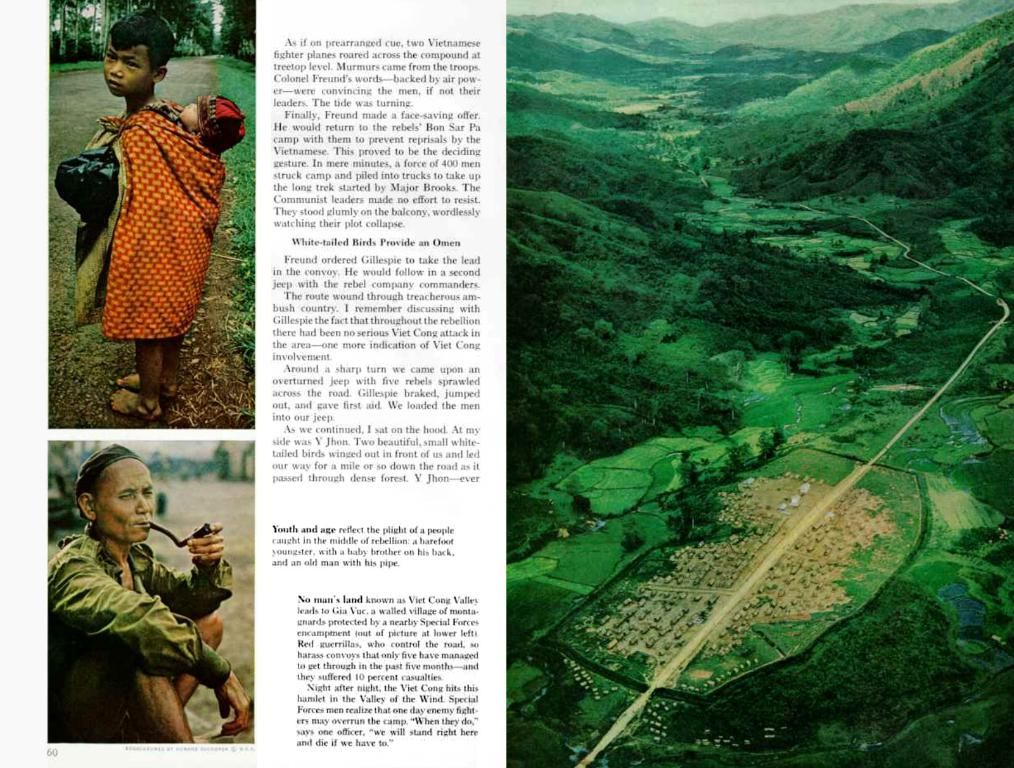Urban Agriculture: Is it a Sustainable Solution for the Future?
Advocating City Farming: Benefits and Potential of Cultivating Crops in City Settings
The human population is soaring, anticipated to reach nearly 10 billion by 2050. The challenge here is immense - our planet need to produce enough food to feed this gargantuan crowd, requiring a staggering 50% increase in our current food production.
The industrial food system, which we've grown accustomed to, falls short. In search of solutions, we delve into the potential benefits of urban agriculture, exploring the possibility of transforming cities into productive, sustainable, and eco-friendly food sources.
A Reimagined Feast for the Cities
The urban jungle, home to two-thirds of the global population by 2050, faces its own battle against food insecurity. As cities become more populated, supply chains are stretched thin, exacerbated by the fluctuating impacts of climate change. The good news is, our cities, with their wealth of resources, are poised to take action.
Planting Seeds of Change
Urban agriculture, a burgeoning movement that encompasses various food production methods, from vertical farms to school gardens, is one such solution. This concept is nothing new - it has deep roots in many communities throughout history, particularly in the Global South. In modern times, it's found a foothold in the Global North, driven by the desire for fresher, more locally-sourced produce.
For urban agriculturalists, the dream is to nourish city dwellers, taking pressure off external food supply chains and shrinking carbon footprints. Worthy as the goal may be, is urban agriculture ready to bear the fruits of a more sustainable city?
Separating the Kernel from the Chaff
While the potential of urban agriculture is promising, it's not without its limitations. A recent study predicts that urban agriculture could account for just 1-3% of global food production, casting doubt on its capacity to alleviate food security issues on a large scale. Furthermore, sky-high real estate prices make it challenging for urban farmers to compete with property developers for viable land.
But, as we focus on agricultural economics alone, are we underestimating the true value of urban agriculture?
A Bountiful Harvest Beyond the Balance Sheet
The environmental, social, and psychological benefits of urban agriculture run far deeper than a simple profit-and-loss statement. For instance, rooftop farms play an integral role in energy conservation, reducing heating and cooling energy consumption and mitigating the urban heat island effect. Urban agriculture can also have significant air pollution-absorbing properties and could attract pollinators back to urban environments, preserving the delicate balance of our ecosystems.
When it comes to the environmental benefits, the numbers are jaw-dropping. One study estimates the annual value of ecosystem services from urban agriculture—through energy savings, nitrogen sequestration, and stormwater runoff reduction—to be a staggering $33 billion.
In terms of social and psychological benefit, urban agriculture fosters community engagement through spaces like community gardens, promoting interaction and a sense of belonging among city residents. The positive mental health benefits of these green spaces are well documented, with research indicating that such environments reduce the risk of high blood pressure, cardiovascular disease, and other health issues.
Taking Root in the City's Future
The climate crisis compels us to reconsider the value we place on non-commodifiable goods and services like the natural world and human health. Embracing urban agriculture represents a chance to nurture food security, support the environment, and rejuvenate communities.
Encouraging urban agriculture in our cities, however, demands more than just monetary incentives. Cities must create an enabling policy environment in which a variety of urban agriculture projects can thrive. This means providing accurate information, advice, and resources to help cultivate this movement. Each urban agriculture project is unique, with its own set of contexts, needs, and aspirations. Therefore, it's essential to cultivate policies that consider the intricacies of each individual initiative, especially in diverse neighborhoods where racial injustice persists.
A Sustainable Vision for the City That Dwells Within
Urban agriculture, on its own, may not be enough to feed our cities of the future. However, it offers a remarkable opportunity to augment the local food supply, reintroduce nature to urban landscapes, adapt to climate change, and build stronger, more connected communities. As more folks cultivate appreciation for urban agriculture, it's up to us, the citizens, to sway governments and policy makers to embrace this movement and elevate the value we place on urban sustainability and resilience.
- Urban agriculture, with its deep roots in history and modern-day renaissance, offers the potential for fresh, locally-sourced produce, reducing pressure on external food supply chains and shrinking carbon footprints.
- By exploring environmental science and the impact of climate-change, we can appreciate the numerous benefits of urban agriculture, such as energy conservation, air pollution absorption, ecosystem preservation, and mental health promotion.
- To foster a sustainable city, it's essential to create an enabling policy environment for diverse environmental-science projects like urban agriculture, providing accurate information, resources, and consideration for the unique needs and aspirations of each community, ensuring equitable access for all.




